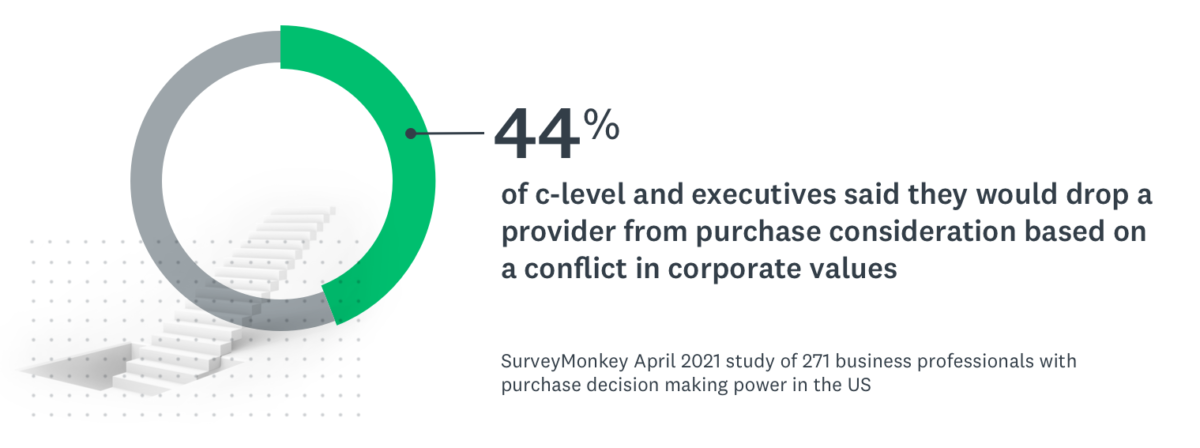“Nobody ever got fired for buying IBM.” That old adage still offers some shreds of wisdom for today’s technology contenders. B2B tech companies have typically focused on products and features; sometimes over all else. But established tech giants are aware of the value of a reliable brand, and are investing in brand performance.
Chief Marketer list of top 100 B2B brands puts Google/Alphabet in the number one spot. Google underwent a noteworthy rebrand in 2015, adding Alphabet as the parent company and cementing its reputation as a technology conglomerate. IBM ranks 8th on the same list, making the 109-year-old giant’s pre-eminence something few companies have been able to achieve in a constantly evolving marketplace.
Checking one’s brand reputation may seem novel for tech companies, but the last year has made it clear that customers and markets are watching. From security breaches to inclusive hiring practices and privacy policies; some of the largest B2B tech companies have faced new scrutiny that has impacted their brand reputation.
Tech leaders, such as Facebook, a social platform for business as well as consumers, took a brand hit when its policies were in conflict with those of its Silicon Valley counterparts and customers. The tech industry has been called out on prioritizing profits over people, and scored poorly on community and charitable giving metrics.
All of this has contributed to a new awareness of the value of brand and company reputation. Environmental, social, and governance (ESG) factors have become a new scorecard, as the financial community recognizes that tech companies who score higher on ESG outperform lower scoring companies.
ESG initiatives have made it into the core values of some of the world’s top tech companies. Salesforce, Microsoft, and Cadence top Investor Business Daily’s annual list of ESG companies, and financial markets are pushing for common standards to better compare companies’ practices.
Social values, such as diversity, equality, and inclusion (DEI), are increasingly important to technology decision makers. According to ToolboxHR, 51% of tech companies now report on DEI metrics.
Brand matters for B2B business decision makers
We wanted to find out more about B2B brand performance, and its impact on purchase decisions. In April, we launched a study of 271 business professionals with purchasing power,* and learned that the factor that mattered the most when choosing a software provider relates to brand. In fact, 57% of respondents said that company reputation is the most important factor when making a decision on a software provider, the leading response.
Company reputation matters even more to the c-suite. Amongst the c-level and executives, 89% said company reputation matters the most when making a decision about a software provider. Software decision-makers agreed, with 88% putting company reputation on top. Last place for this group? Company market share, with only 22% ranking this as important.

When making a decision about a software solution (vs. a software provider), the answers varied. Service and support came up on top at 63%. Just over half of respondents said price, while feature set came in last at 25%.
Brand values also have an impact on decision making. When respondents were asked if a provider they were considering had made a business decision that conflicted with their company’s values, one-quarter of respondents said they would consider a competitive product, and 18% said they would drop the company from consideration.
The higher up you go in an organization, the more brand values matter. Amongst the c-suite, 44% said they would drop a company from consideration that had conflicting values.

So, how can technology companies keep tabs on whether their company reputation is an asset or a liability? And, how can they help their brand performance evolve to keep up with customer values as they continue to evolve?
The answer starts with data. Understanding your company reputation can make the difference between landing on the preferred vendor list, or being dropped from consideration. Market research solutions, like brand tracking, can help technology companies understand their company’s brand performance over time.
Tracking your company reputation
Brand tracking is a common research undertaking for consumer brands who need to stay on top of shifting consumer sentiment. Leading technology companies are increasingly turning to brand tracking to follow market and competitive shifts.
The problem with traditional brand tracking is that it’s a slow-moving process, where results can take months to produce. It also provides a rear view mirror perspective, based on periodic measurement and time-consuming reporting. And, for B2B brands, finding the right professional sample can be a challenge.
Since tech companies base their success on staying agile, having access to current data is critical. SurveyMonkey’s Brand Tracker helps companies continuously measure brand performance and tap into brand health on demand. Companies can track their vitals on a variety of metrics—from awareness to reputation—and spot changes more frequently than ever before.
Instead of waiting months, companies get current, in-the-moment insights into company reputation, and can gauge the effectiveness of other initiatives, filtering results by market segment, time period, geography, and more.
Ensuring new initiatives improve your B2B brand
Long-term, brand tracking can help B2B companies measure company reputation, and stay ahead of issues that could trickle down into purchase preference and ultimately customer loyalty.
For example, if a company experiences a data breach, brand tracking can uncover the impact that event has on brand reputation. Likewise, if a B2B company rolls out a new DEI initiative, a brand tracking study can find out how that resonates with different markets.
Testing how a message or claim will resonate with target customers can also be done in advance. A claims and messaging study can give B2B tech companies feedback from target market segments on ESG or DEI initiatives, and can add context to brand tracking reports.
Bringing brand reputation full circle
A B2B tech company’s reputation is a crucial part of the decision making process. Having insights into what customers value, market shifts, and competitor strategies can help tech companies stand out.
- Methodology: This study was conducted using SurveyMonkey Audience in April 2021 to collect a sample of 271 business professionals with purchase decision making power in the US.
About SurveyMonkey for Market Research
SurveyMonkey Market Research Solutions make it easy to collect quality data from a target audience, fast. The on-demand market research offerings include flexible surveys, the integrated SurveyMonkey Audience panel that provides instant access to 144+ million respondents worldwide, automated solutions with built-in methodology and AI-Powered Insights, and research services like survey design, translations, and reporting.


